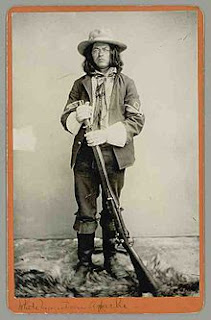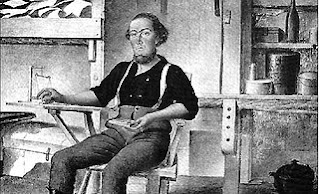Mickey Free and the Bascom Affair
By the time of the American Civil War the captivity narrative was a common genre in American fiction. Fiction, because many accounts of captivity of White settlers by Natives that were once factual, including those by Mary Jemison, Hannah Dustin and other, had gone through several editions. Editors added in additional details, often distorting the original narrative. The capture of a young Mexican boy in Arizona in 1861 added a new wrinkle to the captivity cycle. His capture would spark a war with the Apaches that lasted over 25 years in some of the most brutal fighting in the west.
Mickey Free, 1847-1914, was the son of Jesusa Martinez and Santiago Telles. Telles refused to marry Jesusa, so her son was often known by her name as Feliz Martinez, in addition to his father's name of Telles. Rumors, but not fact, indicated that Felix was in fact half Apache, but likely that was a detail added later in his life. Eventually, Jesusa and her children moved in with an Irish rancher named John Ward on Sonoita Creek in Arizona. Ward raised Felix as his own son, even giving his name in a census as Felix Ward. In January 1861, Felix was tending his stepfather's cattle when he was captured by a Pinal Apache war party and quickly traded to the Coyotero Apache. Apaches routinely took slaves and rustled cattle. However, for the most part, they had been careful not to take White farms, preferring instead their age-old enemies, the Mexicans. Ward went to authorities at Fort Buchannan and blamed the nearest culprits, Cochise and his Chiricahua Apaches, who weren't even in the field at the time.
Lt. George N. Bascom set out to find the trail, and finally picked it up heading for the Chiricahua Mountains and Apache Pass. He didn't know that other bands of Apache facing pressure from ARmy outposts in Arizona were also beginning to use the trial. Bascom was equally quick to blame Cochise. In February, 1861, he met with Cochise at Apache Pass. Cochise denied having Felix in his possession but said that he would find the boy and bring him back. Bascom informed Cochise that he and his family would be held as hostages until the child was returned. Cochise drew his sheath knife, slashed the side of the tent and escaped, leaving his brother and nephews in Bascom's custody. The Bascom Affair now intersects with Felix's personal story. Cochise raided a wagon train of traders, took some hostage, and offered these to Bascom to release his relatives. Bascom insisted on having Felix back or he would hang the Apaches under his control. Incensed, Cochise killed his hostages and fled. Bascom hung two of Cochise's nephews and his brother. This incident sparked a feud with the Apaches that would last until Geronimo and his band were captured in Skeleton Canyon in 1886.
Meanwhile, Felix was in no hurry to return home. He was adopted by a Coyotero leader and became a foster brother to another Apache leader known as John Rope. He grew up among the Coyotero, learning the ways of a warrior and becoming one himself. When he rejoined White society, it was as a member of the U.S. Army's Apache Scouts. Fluent in English, Spanish and Apache, he soon rose to the rank of Sergeant. Al Sieber, the chief of scouts, didn't understand his Apache name or care for his Hispanic one, either. He renamed Felix Mickey Free, after a character in a popular dime novel of the day, and the name stuck. Mickey served with General Crook on raids against Geronimo and Nana, and later accompanied Apache leader Chatto and other Apaches to Washington in 1886. When not occupied with the scouts, he also sought work as a bounty hunter, bringing in fellow scout and renegade Apache Kid, earning a sizable reward.
He left the Scouts in 1893 and lived on the Fort Apache Indian Reservation with the White Mountain Apache who'd been allowed to remain there. He married four times in his life, his wives and children being Apache. He died in 1914.
Mickey Free, 1847-1914, was the son of Jesusa Martinez and Santiago Telles. Telles refused to marry Jesusa, so her son was often known by her name as Feliz Martinez, in addition to his father's name of Telles. Rumors, but not fact, indicated that Felix was in fact half Apache, but likely that was a detail added later in his life. Eventually, Jesusa and her children moved in with an Irish rancher named John Ward on Sonoita Creek in Arizona. Ward raised Felix as his own son, even giving his name in a census as Felix Ward. In January 1861, Felix was tending his stepfather's cattle when he was captured by a Pinal Apache war party and quickly traded to the Coyotero Apache. Apaches routinely took slaves and rustled cattle. However, for the most part, they had been careful not to take White farms, preferring instead their age-old enemies, the Mexicans. Ward went to authorities at Fort Buchannan and blamed the nearest culprits, Cochise and his Chiricahua Apaches, who weren't even in the field at the time.
Lt. George N. Bascom set out to find the trail, and finally picked it up heading for the Chiricahua Mountains and Apache Pass. He didn't know that other bands of Apache facing pressure from ARmy outposts in Arizona were also beginning to use the trial. Bascom was equally quick to blame Cochise. In February, 1861, he met with Cochise at Apache Pass. Cochise denied having Felix in his possession but said that he would find the boy and bring him back. Bascom informed Cochise that he and his family would be held as hostages until the child was returned. Cochise drew his sheath knife, slashed the side of the tent and escaped, leaving his brother and nephews in Bascom's custody. The Bascom Affair now intersects with Felix's personal story. Cochise raided a wagon train of traders, took some hostage, and offered these to Bascom to release his relatives. Bascom insisted on having Felix back or he would hang the Apaches under his control. Incensed, Cochise killed his hostages and fled. Bascom hung two of Cochise's nephews and his brother. This incident sparked a feud with the Apaches that would last until Geronimo and his band were captured in Skeleton Canyon in 1886.
Meanwhile, Felix was in no hurry to return home. He was adopted by a Coyotero leader and became a foster brother to another Apache leader known as John Rope. He grew up among the Coyotero, learning the ways of a warrior and becoming one himself. When he rejoined White society, it was as a member of the U.S. Army's Apache Scouts. Fluent in English, Spanish and Apache, he soon rose to the rank of Sergeant. Al Sieber, the chief of scouts, didn't understand his Apache name or care for his Hispanic one, either. He renamed Felix Mickey Free, after a character in a popular dime novel of the day, and the name stuck. Mickey served with General Crook on raids against Geronimo and Nana, and later accompanied Apache leader Chatto and other Apaches to Washington in 1886. When not occupied with the scouts, he also sought work as a bounty hunter, bringing in fellow scout and renegade Apache Kid, earning a sizable reward.
He left the Scouts in 1893 and lived on the Fort Apache Indian Reservation with the White Mountain Apache who'd been allowed to remain there. He married four times in his life, his wives and children being Apache. He died in 1914.




Comments
Post a Comment